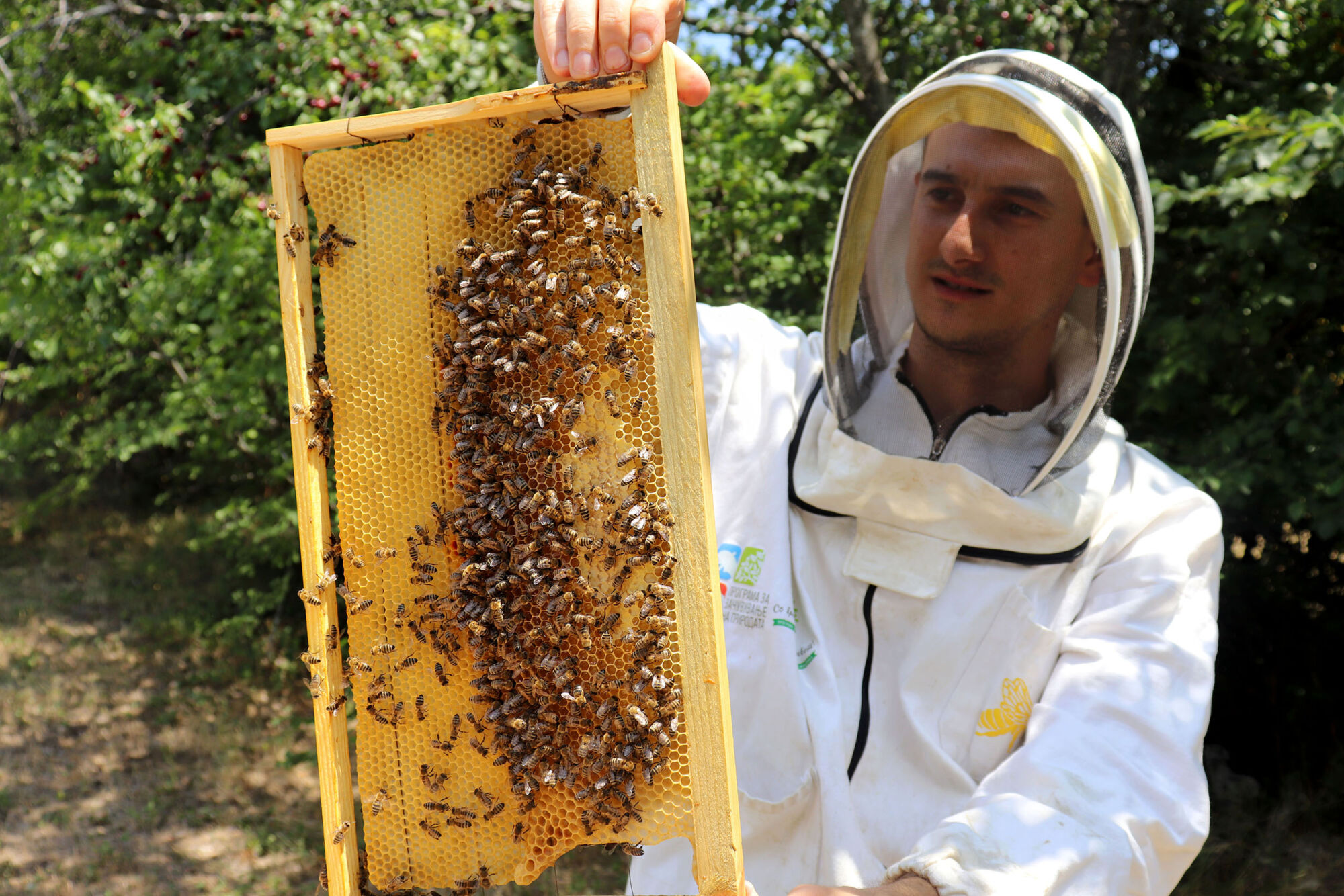“Without the bees there is no life!”, says Lazo Krumov. “The reason why I started beekeeping is my love towards the bees, the nature and preserving biodiversity.”
This natural affinity of his towards environmental issues was enhanced when he first attended a training of Meden Istok, the only association in North Macedonia with a sustainable concept in beekeeping.
The association is focused on attracting young people from the rural areas who want to start a beekeeping business, offering them trainings and certificates for sustainable honey production.
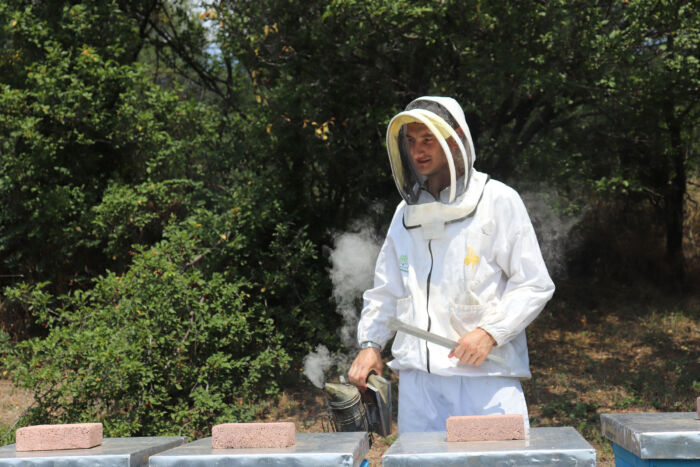
Soon after the trainings, the beekeeping apprentices like Lazo Krumov can produce and sell their own honey under the certification mark “Sustainably produced honey and other bee products”. All of this is supported and facilitated by We Effect’s partner organisation in the country, the National Federation of Farmers – NFF, though our IISEE project in the country.
“We are working together with my father, who also attended the trainings. I stated first, but my idea is for this to grow into a family business”, says Lazo, who began with only three, but now has nearly 30 beehives located on a mountainous terrain, 13 kilometres away from his native village Gorni Podlog, in the eastern part of the country.
“The training for sustainable beekeeping is certified and recognized throughout Europe, so with this label of certified sustainable production we can sell the honey anywhere in Europe,” Lazo is excited to say.
But the most important aspect for him in terms of the beekeeping business is promoting sustainable use of natural resources and application of biotechnical methods to ensure good quality and safe bee products.
I want to be involved in quality beekeeping. I am not seeing beekeeping only as a business
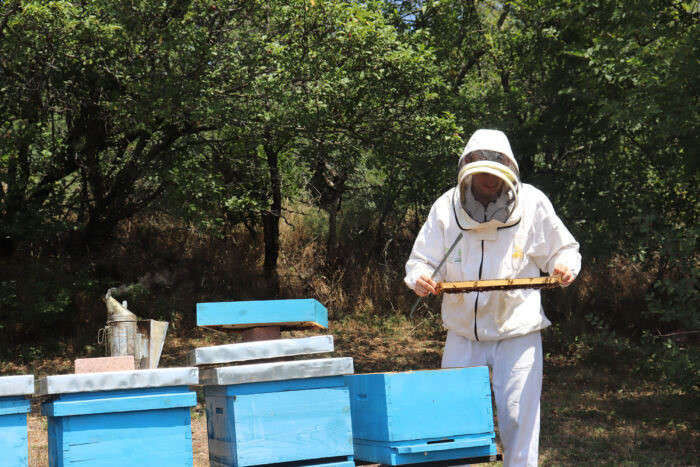
Lazo says that if somebody’s motivation for beekeeping is only quick material success, then that is no success at all!
“Our idea in the Meden Istok association is for all of us to have the same high standard of production, to make a difference on the market, so that the production is of high quality, but also profitable, and for us to be established as a brand in North Macedonia!”
In this context, a quality bee product, according to Lazo, is a product that doesn’t contain any pesticides or chemicals that are harmful for human health, but also for the nature and for the environment.
And in order to get to high quality products, he believes that both farmers and beekeepers should join forces in using sustainable practices.
“If farmers are careful at what time they spray the pesticides, which is of special importance to the beekeepers for the spraying not to be done when the plants are in blossom, this will be very beneficial for us. In turn, we, the beekeepers, will contribute for their blossoms to be pollinated in a natural way and their yields to be greater. This way we can all have better yields, both in terms of quality and economical benefit,” says Lazo.
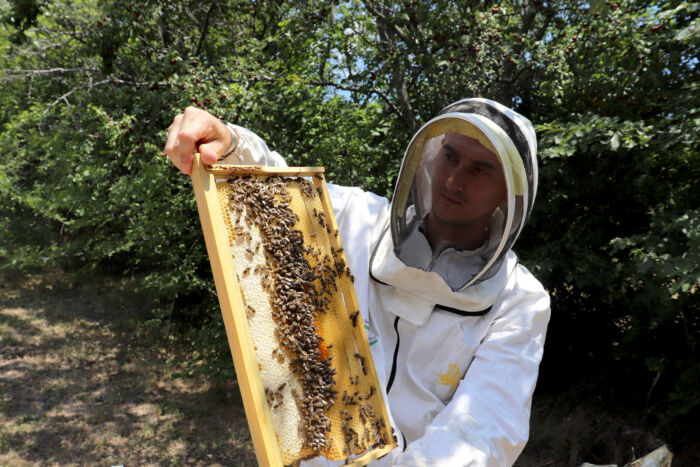
However, sustainability efforts of both beekeepers and farmers are often challenged by climate change. Lazo admits that every segment of agriculture in North Macedonia, including beekeeping, is affected by climate change.
“There are lot of problems related to climate change. The seasons are blurred. Before, there were more humid periods that are very important for the beekeepers, there were rainfalls, and now, all of these periods are very short. Ahead of us are prolonged droughts and if there is no vegetation in our surroundings this is a big problem for us and our bee families,” says Lazo.
For him, this situation can also be a lens for thinking about personal choices and behaviours.
“There is lack of connection of the people with the nature, lack of respect towards the nature. I would like to appeal to everyone to reduce any impact on her and to leave nature to work on her own. Perhaps like that we will be able to solve all these problems such as climate change, caused by human activity and impact on nature. But if we continue to affect nature artificially, I don’t think that we can achieve a good result because after all, nature is nature, and there is nothing more powerful than that!,” concludes Lazo.
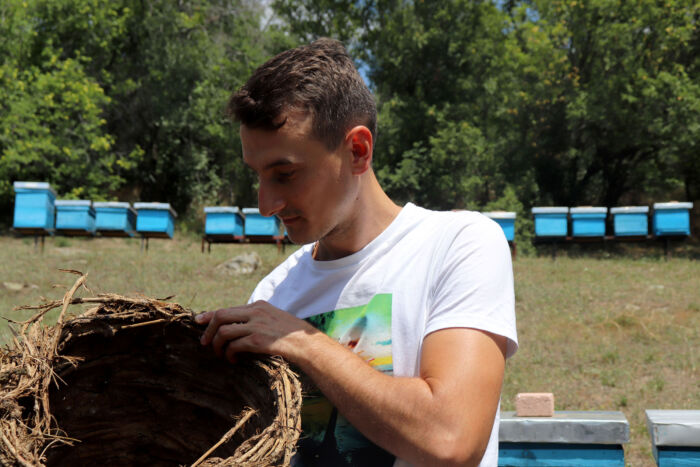
But no individual can live a “sustainable” life on their own. Sustainability is a collective endeavour and Lazo is aware that a long-term strategy by the competent state institutions is needed.
“We only need vision, plan and action! You may create a successful business, but for something greater, support is needed from the institutions or the state,” he says.
He explains that beekeeping seeks lot of knowledge, commitment and sacrifice. Also, it takes time for the investment to be returned, usually in 3 to 5 years.
“I hope for an improved livelihood, but in the long run. With continuing investments,” he says, adding that in this context there are two ways of seeing the beekeeping: through the prism of love and through the prism of economic benefit. And his approach is maybe slower but is all about love towards the bees and the beekeeping.
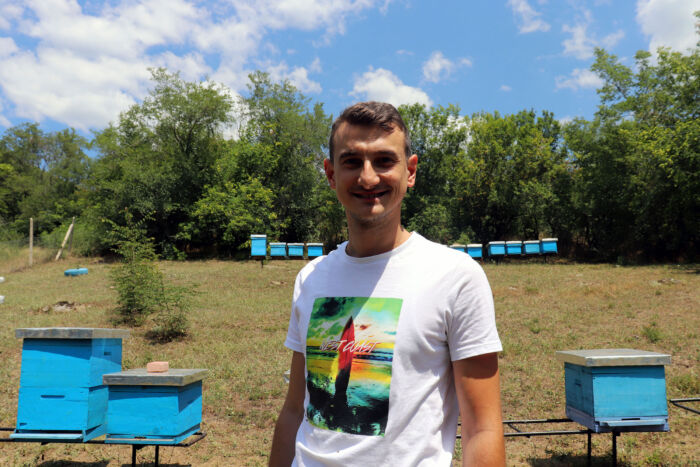
His next big step is obtaining the certificate for sustainable honey production from Meden Istok and selling his honey under this brand.
In this context, We Effect’s partner organisation NFF and its association Meden Istok are trying to strengthen the beekeeping activities as a collective endeavour, among other things by enabling young people to scale up their honey production and provide them with a wider platform on which to market and sell their honey.
The project also has a potential to reduce migration of young people both in the country’s capital and in Western Europe, by showing that investing in beekeeping can generate real income.
“We need to be visionaries and to try and create something here as opposed to all of us trying to get away from here. Let’s offer added value on the market, show good results in capitalism, good quality, and let’s try to make a better tomorrow for everyone. Because there is no place like home and the best place to be is always – home!”
